

Interview with Captain Jack Miller, Operations Officer and lead pilot of a B-17 crew of the 95th Bomb Group. Miller flew in some of the most violent air battles of the war (Kiel, Bremen and Schweinfurt), where the Germans put up heroic defense of their families and homes. He was awarded various medals, such as two Distinguished Flying Crosses. Phone interview, 1994.

[Above: Captain Jack Miller from the 1984 documentary "All The Fine Young Men".]

I wanted to ask you about the bombing raids you took part in against Germany during the war. First off, what was life like in England for American service members? How were the relationships with the civilians?
Jack: It was very good, we had plenty to eat and drink all the time. Our bases were always close to towns or cities, so there were lots of chances to go blow off steam.
We always had to keep our quarters clean and orderly, and our CO would do inspections every so often. If you failed you lost liberty to go into town.
The women were great; they liked having us as company while their men were gone. Even though there were orders to respect their marriages and not fornicate with them, some men did not follow the rules. I think just about every man in my squadron had a girlfriend, often fights would break out over who was with who.
The older English had a saying that we were "over paid, over sexed, and over here." GIs lived up to that to a tee from what I saw. Almost every free weekend was a carefree party at the nearest club, we had to have a way to thaw our nerves, and drowning in women and beer was the way to help.
I was newly married, so of course I did not partake in any of this, but plenty of my buddies did. I remember we had an incident where an officer was having an affair with a secretary, and her husband came home on leave while he was at her house. All hell broke loose and it resulted in tighter rules for the men.
Over all I have to say we had good relations with the civilians, there was some tension with the military men, I would hear of fights and rivalries but in the end we were on the same side. The British soldiers certainly did not like GIs moving in on their women.
We talked about the bombing raids earlier; can you describe what it was like, and what targets you hit?
Jack: We hit whatever we were told to hit, the 95th was all over Europe giving hell to the Germans. Being in a B17 was a gut wrenching experience, I will tell you. The planes were finicky, and due to inexperienced pilots, we had many mishaps. Once while organizing for a raid, a ship crashed into another bringing both down.
We had problems on the runways sometimes just getting set for take off, some pilots were careless. One young fellow took off too soon and came crashing back down in a ball of fire. So just getting ready and in formation for these raids was a real challenge.
We only had to do 25 missions then we rotated home and went into training or other tasks.
The reason for the 25 was that the Germans were so good at shooting us down that most men did not make it until the 25th mission. If you did, you counted yourself as very lucky. We found at first most of the heavy flak was over military targets like the sub[marine] pens in France, the cities were moderate, but that changed once they saw we were hitting cities as much as military installations.
We also had to watch out for German fighters, they were very brave pilots, who may have been young and inexperienced, but sure put up a fight. They would always try to hit us head on with their first attack, which scared the shit out of us. Can you imaging seeing the plane coming right at you, not knowing if he would hit you.
We had pilot error, flak, and fighters to contend with while doing these missions, it is a wonder we were effective as we were. We had set altitudes for bomb runs and they picked off ships like a turkey shoot. It was not until later in the war when we got the escorts that we were better protected, but even then the Germans were fearless and would blow right through the fighter screens.
Now for targets, at the beginning we were tasked with hitting France, Holland, Belgium, and of course Germany. Our targets were mostly military in nature, of course when the weather wasn't ideal we missed, based on statistics, we missed more than we hit, but we were effective enough.
There were missions over Paris and some of the larger French towns also; we were told the Germans used the French workers for their side and factories needed to be destroyed. These missions were designed also to destroy rail yards, bridges, and barracks areas.
Can I interrupt; did you see the results of these bombing raids?
Jack: No, I was a pilot so I never got to see any results; we were usually the lead ship also. From where I sat I would never be able to look back down to see what happened, and the rear gunner had to advise us of what he saw.
Now back to targets. One thing I bet you didn't know is that we also bombed Switzerland. They damn near sided with Germany over this, but they started attacking our ships when they crossed into Swiss air space. Sometimes it was easier to do this than navigate around it. Some busted ships had to land and they took the crew prisoners. When they would attack our planes, the brass ordered the Air Corps to bomb some town in payback. You never hear that in school.
I had a buddy who worked in air intelligence, and he told me that it was ordered to hit a few neutral areas to put fear into those thinking of helping Germany. The Swiss raised hell about these attacks, but our papers just told everyone we made an error in target selection, or mistook a Swiss town for a German. These raids were designed to pay the Swiss back for intercepting our planes. I thought you would find that little tidbit interesting.
Now, we started also hitting German cities, especially Berlin. These raids scared me to death as this was a long trip, and even though we had fighters now, their flak was very good. I was also in on the Schweinfurt raid [on August 17, 1943 the Americans suffered a staggering loss of 60 bombers and many more damaged beyond repair], and it was very bloody, and I will never forget how big our losses were. They had a good amount of fighters that pounced on us, and this area was heavily protected by masses of flak guns. They mustered more fighters for this raid than any other and savaged our planes, not many returned without any damage. They also started using smokescreens which hid the targets, so it meant we had to just guess where factories were, this raid proved to be a failure, and cost more lives than what it was worth.
I still see the flak shells bursting like black flowers all around, you never get that out of your mind. I can also still see the planes going down in flames after being hit by flak, it did not take much to disable something important that crippled a 17.
As I mentioned, we started doing daylight raids over Europe, only aiming for military targets, but later on we started to hit the cities. This was done to deprive German workers of sleep and a home, the thinking was it would disrupt production. In this our planners were wrong. I was surprised to learn that Germany did not hit its peak production until October of 1944, hell the war was almost over by then.

[Above: Allied pilots had some 'interesting' mascots. Here are two examples out of many of B-17 nose art. 'What's done in the dark, will be brought to the light'. The German's rightfully called these senseless attacks on civilian cities 'terrorangriffe' (terrorist attacks).]
Can I ask how you feel, or felt, about bombing cities with civilians being the targets?
Jack: It is certainly hard to think of today, I know we spoke about this earlier. It was our orders to do this, and our newspapers made it seem like we were only paying them back for what they did. When you are twenty thousand feet up you do not think of things like that, you only want to survive and do your duty.
I paid no attention to the German propaganda that claimed we were mainly hitting women and children and destroying Europe's treasures. It did not hit me until after the war was over, I then saw the photos of the cities we bombed, and the casualities. Our side made it seem as if they deserved it for following Hitler, but it still never felt right.
We say Hitler was a monster for bombing cities, but we did the same thing and on a much larger scale. We even bombed neutral countries, either by mistake or to send a message. We did our duty and the politics were not our concern. Like I was saying, it was after the war that I got a picture of what our raids did to the people. I felt very bad for them, there were women, children, old, and sick who died by our hands. It made me feel like I was some sort of ruthless killer who guided bombs to end life. As I was out-processing, we had shrinks to meet with us to ask how we were doing; the government knew our job stunk.
We were fueled by so much of our own propaganda that we never saw the enemy as human. We were made to think of them as robots that followed a madman and only our bombs would stop them. I felt numb up there, but at the same time I was helping shorten the war by killing their will to fight. You tried to never imagine what was in the cities, only that they were the enemy who brought on the war.
We were made to hate the Germans at every turn; every movie, article, and radio show taught us this. That is just how you fight a war; you hate the enemy and kill him.
One would think that with Germany's cities all hit they would not be able to keep going, but they fought on even when they knew all was lost. I would think we would have done the same thing, if the shoe was on the other foot. We bombed during the day and the Brits bombed at night to make it round-the-clock so they could not get a break.
How did it feel knowing you reached your twenty-five missions?
Jack: It felt very good, sometimes the twenty-five missions had to be extended for five more if things were really busy. I was very relieved to be done, our last mission was the worst for me, very heavy flak damaged our ship but we managed to make it back. We celebrated with champagne and went into town to dance the night away.
I was able to come home in late '44 to see my wife, and then as was customary, was made an instructor for the new crews being trained. It felt good to be back at home in a land untouched by the war. Life went on as in peacetime, we just had to put up with rationing.
Did any of your men get shot down and become prisoners?
Jack: Not any of my crew, but there were many in our squadron that did. We had very high losses, being in a bomber was not a career that had a long life expectancy. We met up with many friends after the war who returned from Germany. They all survived German camps and most told of pretty decent treatment, which surprised me. They could hold plays, sporting events, movie nights; they all said the food was terrible as it was mostly vegetables and bread.
It was not at all like that show Hogan's Heroes, there were no secret escapes, and the Germans were very smart people. They played no games with contraband if it were found out the men were punished I was told. It was against the rules of war to do this and to try it invited retaliation as well so it never happened like the show portrays.
While our ship was hit a few times, I am so lucky that we never went down. I saw many a crew jump and always felt bad to see it, but thankful whenever we saw a white chute open. There were times when we saw the men go out but no chute opened.

[Above: Captain Jack Miller.]
What were the German pilots like you faced?
Jack: they seemed very determined to bring us down that is for sure. They flew very fast and often flew in zigzags to avoid our gunners. Like I said they had tactics that would bring them head on with us and it was damn scary to know this. On our 11th mission, it was over France, one [Messerschmitt Bf] 109 attacked us and badly wounded the front gunner and bombardier.
We had to manually jettison our load so as not to land with it, which was a harrowing experience, one of the worst I was in. A bullet missed my foot by just an inch, and it would have been bad if it hit me, as the pedal would have been hit. The Germans had captured some intact B17s and they studied how to bring us down. They got better as the war went on, but then so did our numbers. We received escorts later on which did a lot to take care of the fighters.
They even had jet planes, the first in history, which they attacked our formations with later on. I missed these attacks as I was done by then and back home, but I would read about them. We trained the boys to be mindful of their tactics. There was one that was brought back here to Wright Field and I was able to look it over.
These were some brave men to get into something so new and not battle-tested, yet they had good success in these, they were so fast it was hard to shoot down. A buddy of mine saw one take out a [P-51] Mustang right in front of his ship. Blew it right out of the sky with a lucky cannon hit.
They had cannons where one hit would do any plane in. All German planes had those cannons I think. They would aim for the wings or cockpit, any hit there would be fatal for a plane. You can see now how nerve-wracking it was up there; it was no job for a slouch to have.
We had a professor bring in a black pilot from a squadron called the Red Tails. They claimed they never lost a bomber they escorted. I felt this was a bit of black supremacy where they make it seem like they were better than the white pilots. Did you ever see black pilots or know anything about them?
Jack: Well son, yes and no. You see back then the services were segregated. Whites did not serve with blacks; it was just the way it was. As I understand it, it was to keep the learning curve equal, as for example, a black might need more training and would hold back a class. They trained them together so they were all equal and on the same curve to learn better.
I know we had manpower issues so it just made sense to use any man willing to learn to fly. I actually met one of those fellows here quite a while back, might have even been the same one. I have to tell you I was not impressed at his intellect. He was friendly as all get-out, but he didn't seem very smart. That was my first impression. He said he flew a P-47 [Thunderbolt] and escorted bombers. I remember him saying to me he guarded our ass and made sure we made it home.
I have no doubt they were brave pilots and did their duty. As far as not losing a bomber I do not believe that for a second. In fact I have heard that they were not all that good at protecting bombers, and were only given secondary or low priority raids. These would be just small sorties of maybe thirty bombers to hit a low priority factory or something small. Resistance to these raids was very minimal and not much activity.
The crews loved them as it was a safe bet on returning back. To make the claim they make is misleading and I'm afraid only insults the men who really did their best to protect the big raids. Now I am not saying they did not earn their respect, but I am certain that their exploits are not really exploits, and more a figment of their imagination, or jealousy against white pilots.
This is called embellishment, and happens often from what I see. From these guys who quip about having high medals in Vietnam or being Special Forces when they never were, it's all made up bullshit. They should just stand on the merit that they learned how to fly and did combat missions against the Germans, which alone are accomplishments. They don't need to claim fanciful feats and zero losses.
I believe also their stories are meant to belittle white pilots and soldiers. It is as if to say they were not allowed to learn, but learned it, and did it better than whites. If you really dug into it, with an open mind and honest research, I think the findings will never support their claims. It is only with the media and sympathetic Allies who may bend the facts, do they have these stories, which they may not have even thought up on their own.
Some of our own people seem to go out on a limb to give them credit they did not earn, or exploits that really were nothing other than doing their duty. Like the black sailor at Pearl Harbor, he manned a machine gun, and supposedly shot down a Jap plane. He did his duty, and had luck, if it's true.
He is made out to be some kind of oddity because he is black, and happened to crew a gun during an attack. Lots of men did that, but because he is black that is somehow special. That in a sense belittles them, whether they know it or not. It's saying normally they would not be capable to doing such things.
Same is true for black pilots; they were able to learn to fly and to even fly combat missions, which in itself is a big ordeal. When they act as if they are doing something no one else has done, or that they normally couldn't do, it belittles them, even though they don't seem to see it as that. I know they see it as rising above race hate and being kept down, but they were never kept down, they put that in their own minds. I have known whites who did not want to be around them, or work with them, but there are plenty who do, so they had ample opportunities.
I think they let their own race hate and prejudice show with things like this. It sort of goes to prove maybe we should never have stopped segregation; they seem to have done better under it than now. Hell they riot anytime they don't get their way, look at LA, Miami, or even here back in the 60s they damn near burned the city down.
Anytime they don't get their way, or are held accountable for their bad choices, they band together and burn down anything they can. I didn't fight for this, I can tell you that.
____________________________________________________________________________
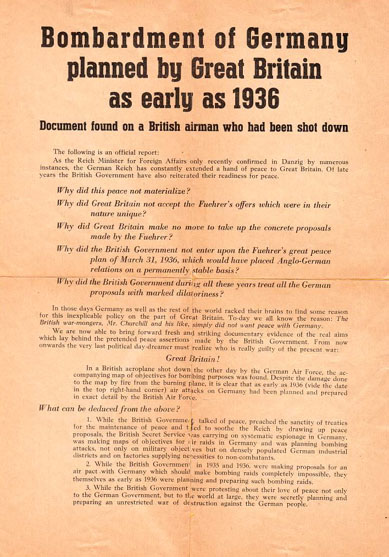
[Above: Document released by Germany presenting evidence of British plans to destroy Germany as early as 1936. In the 1930s Adolf Hitler pressed the rest of Europe to ban inhuman munitions like incendiary bombs. Britain, among others, refused. We must understand that the men dropping the bombs on women and children were and are just as guilty as those issuing the commands. Pilots would even brag about their homicidal works and even say things like 'Hamburgization' of German cities--named after the gruesome bombing of Hamburg, where tens of thousands of civilians died.
One American bomber shot down over Germany was actually captured with a flight jacket on with his plane's name painted on the back. Guess what it was? "MURDER INC."!!!]
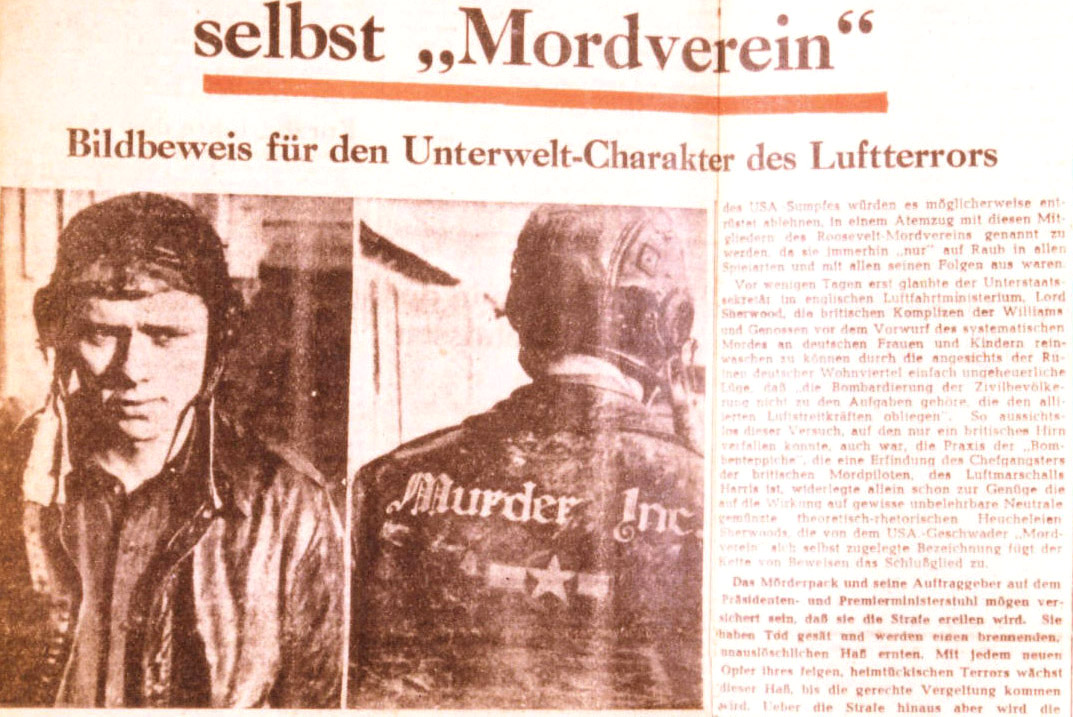
[Above: German newspaper showing a picture of the American 'hero'. This murderer's jacket is the most truthful thing to come out of the war!]
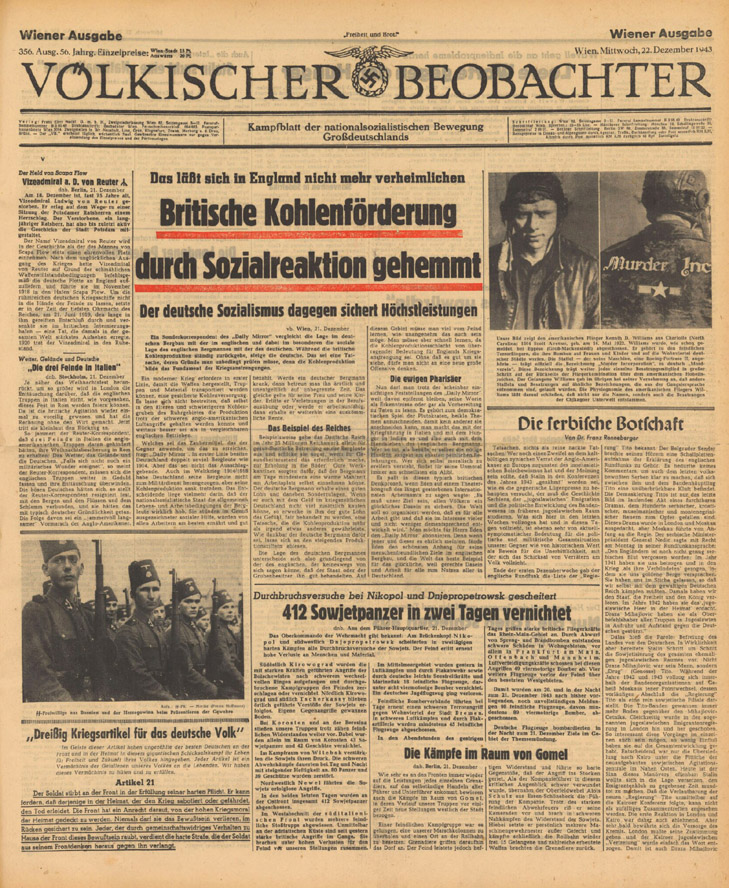
[Above: Front page of the Völkischer Beobachter, December 22, 1943. Click to enlarge.]

[Above: An American newspaper article on Murder Inc.]
The official definition of 'murder' is:
'the unlawful premeditated killing of one human being by another.'
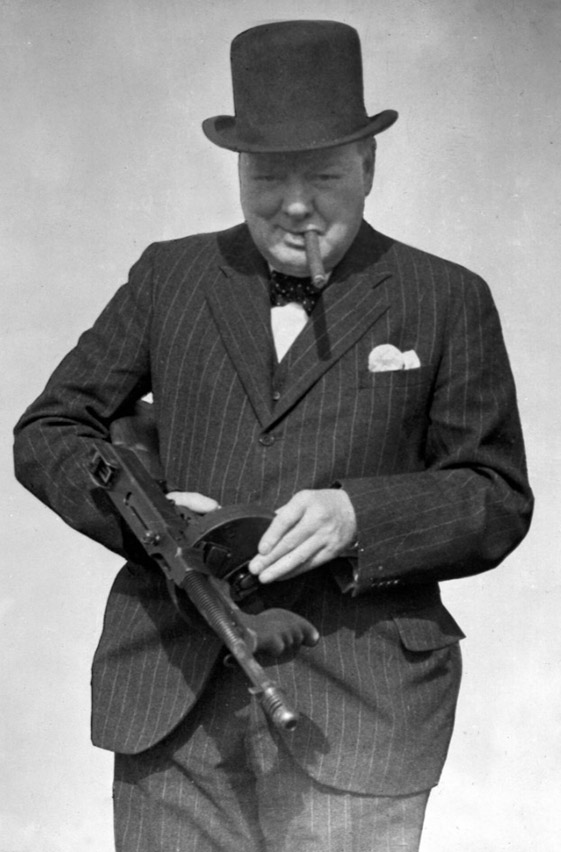
[Above: Here's British leader and mass murderer Winston Churchill in a gangster-styled photo.]
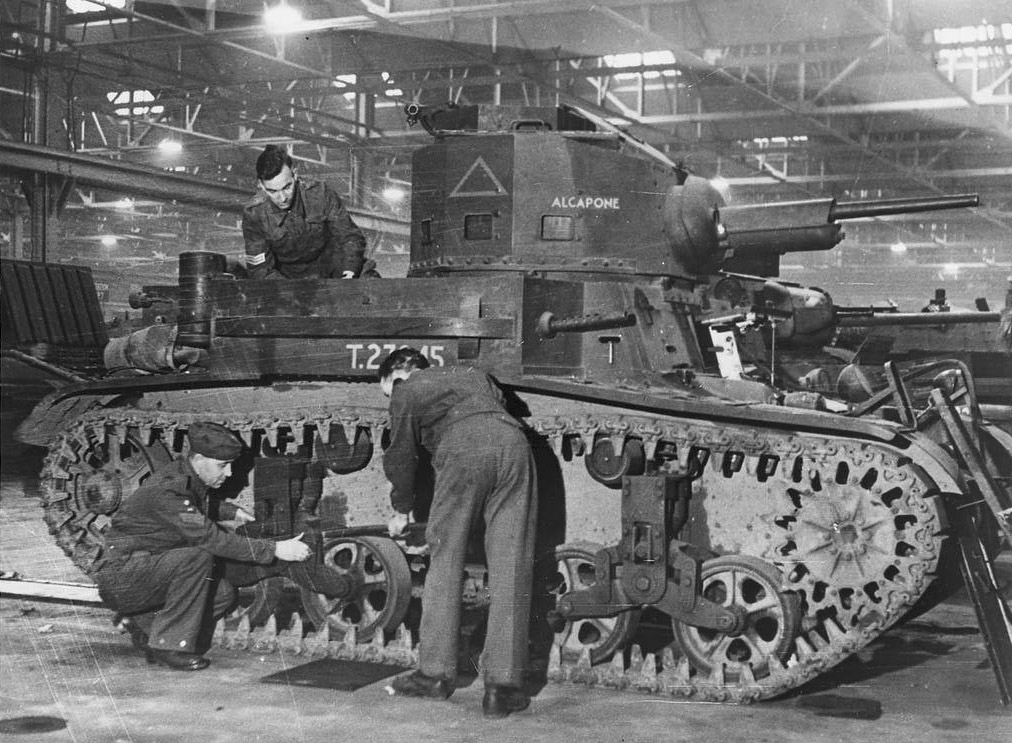
[Above: An M2 Light Tank lovingly named after American mass murderer and gangster Al Capone. This tank was produced under the Lend-Lease Act of the United States, to be sent to America's ally communist Russia, 1941. And shockingly, the United States government actually did work with the mob! Yes, that's right, they actually hired the mob to guard American ports and also to help them with the occupation of Italy [Mussolini had valiantly shut down the mob in Italy and kicked them out of the country]. Sounds absolutely absurd, doesn't it. But it is true. Criminals working with criminals, who would have thoughts?]
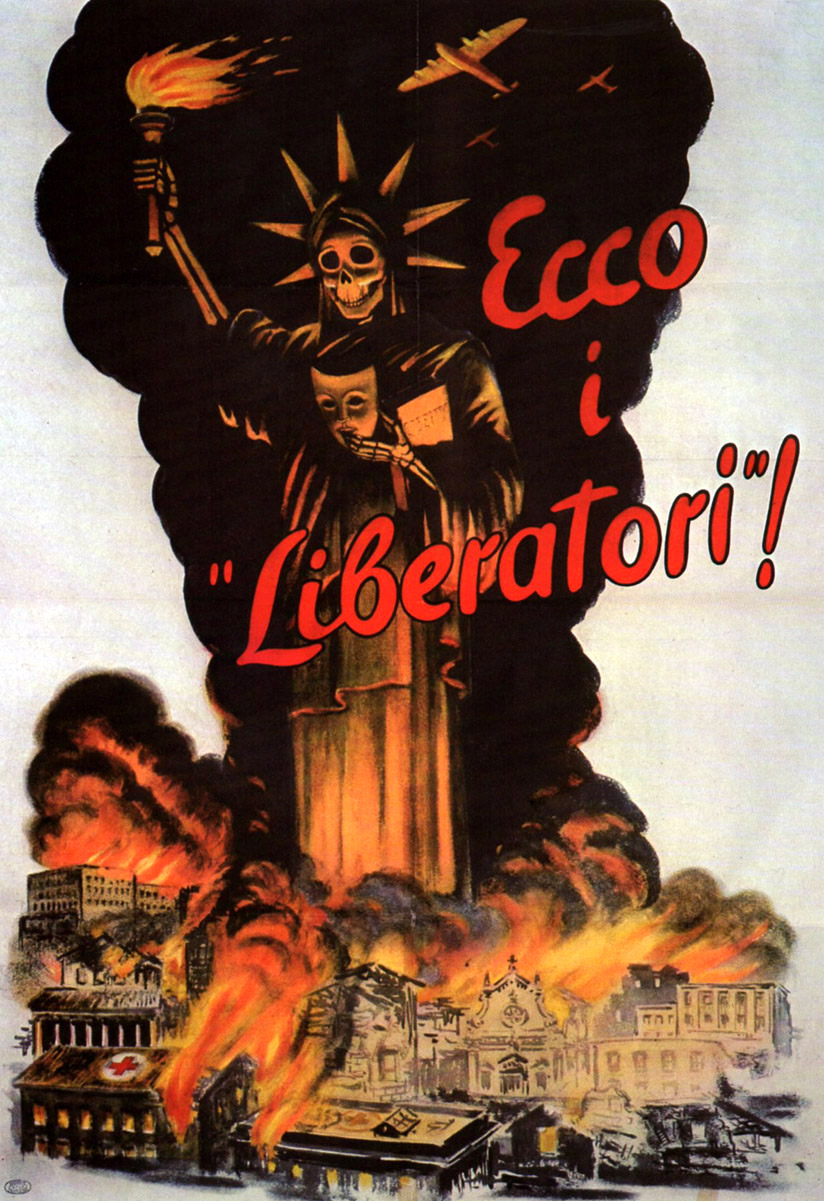
[Above: This Italian poster says 'The work of the "Liberators"!', 1944.]
Back to Interviews














